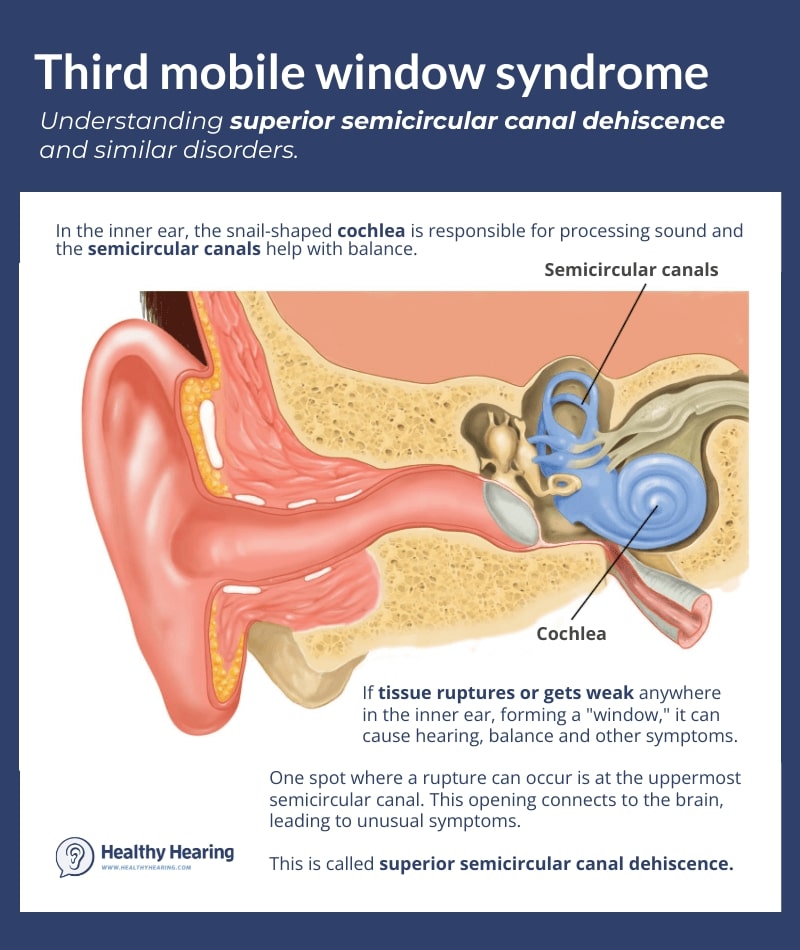|
www.HealthyHearing.com |
What is third mobile window syndrome?This group of inner ear disorders causes many symptoms, including dizziness and hearing lossMonday, May 6th, 2024 By Philippa Thomson, contributor Just like your lungs and blood vessels, your inner ear needs proper pressure to work correctly. Anything that disrupts the delicate balance of pressure and fluids in your inner ear can lead to a long list of uncomfortable or alarming symptoms, including hearing loss and dizziness. When tissue ruptures or weakensOne of the things that can go wrong is a thinning, or actual rupture in the bone or tissues, known as “dehiscence.” The broad name for disorders that cause dehiscence is “third mobile window syndrome.” The ear normally has two “windows,” or holes in the tissue covered by thin membranes. A dehiscence creates a third window. One of the more common third window disorders is known as superior semicircular canal dehiscence syndrome. The superior semicircular canal is part of the balance organ, and so if a dehiscence forms here, dizziness can be the result. Tinnitus and other unusual hearing problems are also possible, given the canal’s proximity to the cochlea, where sound waves are converted into electrical signals.
How common are these conditions?The overall estimated prevalence is 1 in 100 people. What causes them?No one knows for sure, though there is evidence for both an abnormality in development, and trauma to the inner ear that has been acquired later in life. What are the symptoms?There are quite a few possible symptoms from this disorder, such as: Dizziness and balance problems. Some can be unusual, like feeling dizzy when sneezing or when listening to sounds. Also, difficulty keeping a steady gaze at times of hearing loud noises, or when physically straining. Hearing problems. These include:
A range of cognitive and visual problems can occur as well, such as fatigue, memory issues, migraines, light sensitivity, eye movements induced by sound, and spatial disorientation. The symptoms are unpredictable. Some people may experience only a few while others may experience many of them. How are third mobile window disorders diagnosed?Any unusual hearing or balance issues should be investigated by an ear, nose and throat specialist. For example, if you become dizzy when listening to sounds, or you can hear your own heartbeat. An ENT doctor will order hearing and balance testing to measure function and pressure within the inner ear. Imaging studies like a CT scan also may be ordered to help visualize the problem. Are they treatable?Fortunately, yes, usually through medicine or surgery. The most common surgery is occlusion repair, or window reinforcement surgery. Is it manageable without surgery?Yes, people with mild symptoms may find lifestyle adjustments helpful, including:
My experienceThe problem event for me was a sharp change of pressure during the descent at the end of a flight, when I was in my forties. At the time it happened, I had a brutally sharp pain in my left ear. Over a period of months after the flight, more and more symptoms crept in and they were subtly changing or worsening during that time. The headaches became severe, the nausea persistent, my vision was often blurred, and it was extremely uncomfortable to raise my voice, sing or even eat crunchy foods. All the sounds reverberated inside my head. Furthermore, I had great trouble hearing people in noisy surroundings and yet I was also hypersensitive to certain sounds such as a banging door, my dog barking or a spoon clattering onto the floor. I became increasingly aware of creaking noises from my neck and the clicking sounds of my eyes, and as time progressed I also had quite severe tinnitus – terrible whooshing and thumping noises in my ear. The dizziness eventually became debilitating as I was having frequent freeze-on-the-spot attacks in certain types of environment, including supermarkets and busy public spaces. I was no longer just unsteady, my world was starting to spin, and I became very anxious and withdrawn. It was becoming almost impossible to care for my younger child, who is severely disabled. It took me nearly four years to get my diagnosis of superior semicircular canal dehiscence syndrome but I eventually travelled from the UK to America to have surgical repairs in both ears with a leading specialist in Louisiana. My quality of life was immeasurably improved, and I wrote a book to raise awareness and to help other sufferers. Where to get helpIf you are struggling with hearing loss, tinnitus, or dizziness, use our directory of providers to search for an ENT clinic that providers services to patients with dizziness and balance disorders. Philippa Thomson is author of the memoir A Hole in My Life: Battling Chronic Dizziness and co-editor of Third Mobile Window Syndrome of the Inner Ear (Springer, 2023) with Dr. Gerard Gianoli of the Ear & Balance Institute, Covington, LA. This article was reviewed for medical accuracy by Healthy Hearing president Mandy Mroz, AuD.
Related Help Pages:
Hearing loss Types Causes Tinnitus (ringing in the ears) Symptoms Causes Dizziness
|
Featured clinics near me
Earzlink Hearing Care - Reynoldsburg
7668 Slate Ridge Blvd
Reynoldsburg, OH 43068

Find a clinic
Need a hearing test but not sure which clinic to choose?
Call 1-877-872-7165 for help setting up a hearing test appointment.


